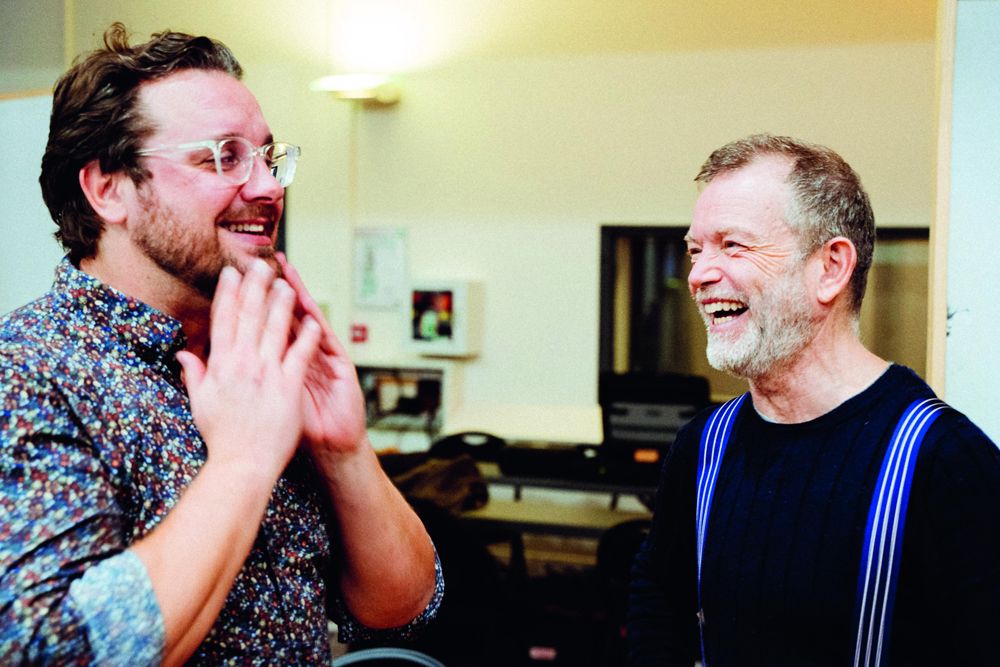
This page is also available in / Cette page est également disponible en:
![]() English (Anglais)
English (Anglais)
Le dernier enregistrement du ténor américain Michael Spyres, In the Shadows, illustre ce qui le distingue dans le paysage actuel de l’opéra. L’album représente une tentative audacieuse de retracer les influences de Richard Wagner parmi les compositeurs qui l’ont précédé.
While the exercise of situating a composer’s style and output among points of reference is quite standard, Wagner’s overarching ego and vain penchant for denigrating both his predecessors and contemporaries has resulted in very little attention paid to his influences.
Spyres points out that one might be able to find mention of these connections in obscure academic papers, but to the general opera public, Wagner is considered to have emerged fully-formed: “Many people have a saviour complex … I do have a problem with that, when one doesn’t give precedence to the people that influenced them.” Where Wagner is concerned, “people don’t know Halévy or Marschner or, in fact Meyerbeer, who Wagner squashed in his own time.”

Michael Spyres and Christophe Rousset recording In the Shadows (Photo by Edouard Brane)
And so, In the Shadows takes the listener chronologically from early 19th-century French works like Étienne Méhul’s Joseph (1807) right up to Wagner’s own Lohengrin (1850), tracing a path that unexpectedly links a composer more associated with bombast to lyrical predecessors like Rossini, Auber and Bellini. “Many people don’t realise that Wagner was so influenced by bel canto. You can see within the scores, there are markings that are only (found) in bel canto,” says Spyres. Listening to the tenor’s gorgeously lyrical account of Lohengrin’s Gralserzählung (Grail narrative), the album’s final track, corroborates Spyres’s claims.
The tenor found further proof in the careers of historic tenors, those who sang this repertoire when it was new. “If you really look at the first Wagnerians like (Bohemian tenor) Josef Tichatschek, they were singing (Meyerbeer’s) Les huguenots, Rossini’s Otello, Berlioz’s Benvenuto Cellini—all of these things that barely anybody can sing nowadays.” He continues: “That’s why this lineage has been a very logical one for me. I’ve always looked in the record books and asked, ‘What were these men doing in their early 30s? Before Wagner came about?’ Ah, lots of bel canto and French Grand Opera!”
Spyres’s own career is closely linked to that of his illustrious tenor predecessors, who sang much more wide-ranging roles than do most singers today. As he points out, male singers sang a very wide repertoire before the Fach system was adopted in the mid-19th-century, which slotted singers into very specific role categories. “Most men didn’t have the luxury of being able to perform on stage, because most of them were working or in wars.” As a result, with fewer male singers available, they “had to be much more flexible with their voices. If you look at tenors, or baritones —which didn’t truly exist—many of them would switch between low bass roles, up to haute contre (very high tenor)—all within a couple of Handel roles.”

Michael Sypres (Photo by Marco Borrelli)
Spyres traces his current wide repertoire to studies undertaken in his late 20s and early 30s when he “started to understand what the French call voix mixte appuyée (supported mixed voice). It’s absolutely the best,” he continues, “and the only way to really approach bel canto and also French Grand Opera. Once I started integrating that, it opened the door to all of these other things.” When asked why his performance calendar might look quite different from that of most of his contemporaries he says, “I don’t think there’s much that I’m doing differently. It’s just that most people who have larger voices, or darker voices … get pushed into a place where they’re already doing Wagner when they shouldn’t be doing it, (when they’re young) in their 20s in their early 30s.” And yet, despite having proven his remarkable versatility on the world’s greatest stages, Spyres admits “through the rest of my career, there are people who will still think of me as a Rossini tenor.”
This brings us back to the endpoint of In the Shadows, namely, Wagner. Spyres’s carefully plotted album mirrors his current real-life career trajectory. Having recently made his role debut as Lohengrin with Strasbourg’s Opéra national du Rhin, this summer marks his first Siegmund in Die Walküre at the ultimate Wagner venue, the Bayreuth Festival. All of this has been carefully calibrated. His choice to include Lohengrin’s “Mein lieber Schwan” rather than the more familiar “In fernem Land” on his album stems from his desire to “show the kind of the duality of voice that you had to have up until Lohengrin, which was the end of an era with Wagner—the last work that he called an opera. Everything else after that was a dramatic musical, Gesamtkunstwerk. Up until Lohengrin, you have to use these two different types of techniques—this bel canto and this darker baritenor or heldentenor.”
Spyres will venture into this darker heldentenor realm with his Bayreuth debut as Siegmund. Despite the expectations of hard-to-please Wagnerites and the legendary status of the theatre, the tenor is feeling optimistic. “I’ll obviously be singing it belcanto-y because that’s what Wagner wanted,” he says. “But if you look back at my career, I’ve sung Candide, and Licinius in La vestale—so many roles that are low like Siegmund. I thought: I can do this. It’s going to be scary, only having two days of rehearsal, but I think I will do it justice.”
Michael Spyres’s In the Shadows is currently available for purchase and streaming. For more information go to www.warnerclassics.com/release/shadows.
Spyres will appear at the Bayreuth Festival (July 25-Aug. 27), as Siegmund in Die Walküre. More on this performance, and Sypres’s upcoming engagements, can be found on his website. www.michaelspyres.com
Playlist
This page is also available in / Cette page est également disponible en:
![]() English (Anglais)
English (Anglais)














